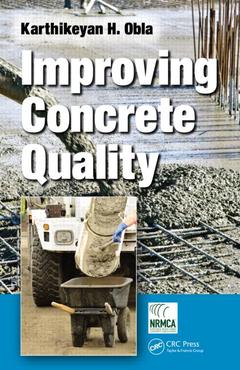Improving Concrete Quality
Auteur : Obla Karthikeyan H

Improve the Quality of Concrete, Improve the Quality of Construction
Quality measurement is not prevalent in the concrete industry and quality investment is not seen as potentially generating a positive return. Improving Concrete Quality examines how and why concrete quality should be measured, and includes instruction on developing specifications with the aim of improving concrete quality.
Reduce Concrete Variability: Reduce Costs and Increase Volume
The first part of the book considers the tangible and intangible benefits of improved quality. The later chapters explore concrete strength variability in detail. It provides a greater grasp of the variation in concrete, as well as a deeper understanding of how material variability affects concrete performance. The author discusses the components of variability (material, manufacturing, testing) and provides steps to measuring and reducing variability to improve the quality of concrete. The text also contains a chapter on data analysis for quality monitoring and test results.
Come Away with Practices and Tools That Can Be Applied Immediately:
- Provides techniques and how specifications can improve concrete quality
- Offers a clear understanding of the link between the materials (cement, SCM, aggregate, water, air), manufacturing, testing variability, and concrete quality
- Includes information on analyzing test data to improve quality
Improving Concrete Quality
How Good is Your Quality? Variation in Concrete Strength Due to Cement. Variation in Concrete Strength Due to Water and Air Content Variation. Mixing Water Control. Variation in Concrete Strength and Air Content Due to Fly Ash. Variation in Concrete Performance Due to Aggregates. Basic Statistics. Variation in Concrete Performance Due to Batching. Variation in Concrete Performance Due to Manufacturing. Variation in Concrete Performance Due to Testing. Internal Concrete Testing. Using Jobsite Test Results for Improving Concrete Quality. Impact of Specifications on Concrete Quality. Impact of Concrete Quality on Sustainability. Elements of a Quality Management System for a Concrete Producer.
Karthik Obla, Ph.D., P.E., FACI, is vice president, technical services, National Ready Mixed Concrete Association (NRMCA). He has over 20 years of experience in concrete materials technology and has interests in quality control/assurance, mixture optimization, specifications, use of recycled materials, durability, and new technology. He is a Fellow of the American Concrete Institute and a winner of ACI’s Young Professional Achievement Award. He has published over 75 technical articles in journals and has presented in several international conferences. He holds a Ph.D. in civil engineering from University of Michigan, Ann Arbor, and is a licensed professional engineer in the state of Maryland. He served as vice-president and president for the ACI San Antonio Chapter. Prior to joining NRMCA, he was technical manager at Boral Material Technologies.
Date de parution : 07-2014
15.6x23.4 cm
Thème d’Improving Concrete Quality :
Mots-clés :
ASTM C311; Mixing Water Content; Standard deviation of strength; Concrete Mixture; Concrete testing variability; ACI 221R; Mixing water control; CUSUM Chart; Concrete batching control; General Construction Testing; Sustainability specifications; Air Content; Concrete variability; Moisture Content; concrete variation; Can; Concrete quality measurement; Strength Test Results; Compressive Strength; Control Charts; Concrete Temperature; Fly Ash; Test Result; Aggregate Moisture Content; Truck Mixer; Mortar Strengths; Single Control Chart; Negative Step Change; Fly Ash F1; Ready Mixed Concrete Plant; Control Limits; Concrete Producer; Positive Step Change



